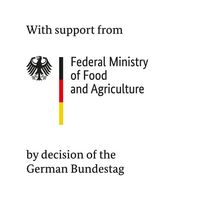Biomethane and peat substitute from poplar wood (PaplGas and PaplGas2)
Poplar wood from short rotation coppice can be used as a local renewable raw material for the provision of renewable energies, e.g. for decentralized heat supply. However, the use of wood heating systems in urban areas faces many challenges, such as the space required for heating systems and fuel storage.
In the PaplGas projects, poplar wood is used in an innovative approach for biomethane production via anaerobic digestion. The degree of innovation is further increased by the combination with the material use of the wood fiber fraction as a peat substitute after separation and aerobic post-treatment of the digestate. The biogas process can be understood as an energy providing upstream conditioning step for the material use.
The reduction of greenhouse gas emissions and peat reduction in horticulture are among the core topics of the projects. The project PaplGas2 (12/2021 – 11/2023; Funding code: 2221MT017A / B) is based on the feasibility study of PaplGas (04/2019 - 06/2021; Funding code: 22038318).
All projects were/are funded by the German Federal Ministry of Food and Agriculture based on a resolution of the German Bundestag. Project management agency is the Fachagentur Nachwachsende Rohstoffe e.V. (special fund "Energy and Climate Fund").
The PaplGas projects are in line with the German National Bioeconomy Strategy due to the research on the innovative conversion concept for local hardwood into peat substitutes and at the same time to renewable energy carriers (biogas/biomethane). The strategic goals “2. Recognise and harness the potential of the bioeconomy within ecological boundaries”, “3. Enhance and apply biological knowledge” as well as “4. Establish a sustainable raw material base for industry” are in particular focus. The objective of the National Biomass Strategy (NABIS) to contribute to climate and biodiversity protection in the medium and long term through sustainable resource use is also to be pursued with the research and development in the PaplGas projects.
History
Vattenfall Energy Solutions GmbH (ESG), as provider of heating services, approached the Deutsche Biomasseforschungszentrum gemeinnützige GmbH (DBFZ) in 2017 with the idea of anaerobic digestion of poplar wood from agricultural wood cultivation as an innovative alternative to the combustion of wood chips. After pre-trials at the DBFZ in cooperation with Energy Crops GmbH (ENC) for ESG, the project idea “Biomethane and peat substitute from poplar wood” (PaplGas) was jointly developed with the growing media manufacturer Klasmann-Deilmann GmbH (KD). As a scientific partner with in-depth microbiological expertise, the MicAS group of the Helmholtz Centre for Environmental Research – UFZ contributed to the PaplGas-project. This successful cooperation is going on in the follow-up project PaplGas2.
